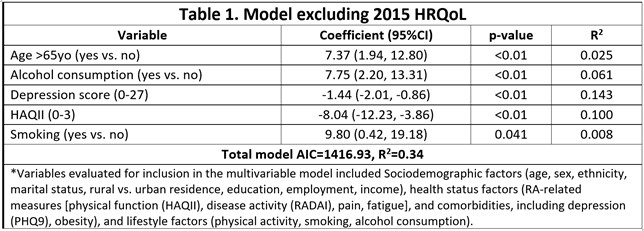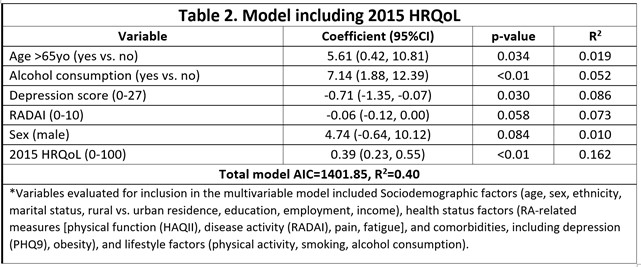Session Information
Date: Sunday, November 7, 2021
Title: Epidemiology & Public Health Poster II: Inflammatory Arthritis – RA, SpA, & Gout (0560–0593)
Session Type: Poster Session B
Session Time: 8:30AM-10:30AM
Background/Purpose: Health-related quality of life (HRQoL) is lower in rheumatoid arthritis (RA) patients compared to the general population, yet a comprehensive study evaluating predictors and the relative contribution of sociodemographic, RA-related, comorbidities, and lifestyle factors is lacking. Our study’s objectives were to identify factors that predict 1) HRQoL one year after baseline assessment; and 2) change in HRQoL over 12 months.
Methods: Survey data from a longitudinal quality of care study of RA patients recruited from a population-based cohort identified using administrative data were analysed. Participants who completed a questionnaire in 2015 and 2016 assessing sociodemographic, health status (RA-related and comorbidities), and lifestyle variables were included. The dependent variable HRQoL was measured using EQ5D-VAS. Three model selection procedures for multivariable linear regression models – stepwise selection (p-entry< 0.05;p-exit≥0.15), all-possible selection, and LASSO method – were used to select important HRQoL predictors. Models were compared using cross-validation (CV) and the model with smallest CV error was selected. Model selections without and with 2015 EQ5D-VAS, in separate analyses, were conducted to determine best models for absolute value-, and change in HRQoL, respectively. We used R2 to assess the variance explained by each model and to determine the relative contributions of sociodemographic, RA-related, comorbidities, and lifestyle factors (sum of R2 values for each domain). Data analyses were conducted using RStudio 1.3.1093.
Results: Our sample included 168 individuals with RA (72% women, mean age 70.7 ± 10.6 years, mean disease duration 24.3 ± 11.9 years). EQ5D-VAS in 2016 was 67.5/100 ± 19.4. Significant predictors and variance explained by models without, and with, 2015 HRQoL are presented in Tables 1 and 2, respectively. The model controlling for baseline 2015 HRQoL had a lower AIC and better predictive ability (R2 value) for 2016 HRQoL. HRQoL in the previous year contributed most to predicting HRQoL. Of the RA-related factors, only disease activity and physical function (in models with, and without, 2015-HRQoL) were significant predictors. Both variables were highly correlated (r=0.69) and likely capture similar disease effects. Of the comorbidities evaluated, only depression predicted HRQoL, and it had a greater contribution to HRQoL than RA-related factors. Lifestyle and sociodemographic factors evaluated in our study contributed little to HRQoL.
Our study limitations include potential respondent bias and a predominantly White and older sample with longstanding disease. Our findings may not be generalizable to samples with different characteristics.
Conclusion: HRQoL in our RA sample was multifactorial. Predictors from different domains contributed to HRQoL. HRQoL in the previous year contributed most to predicting future HRQoL. Depression was the second most important predictor. Early identification and management of depression may improve overall HRQoL in RA patients.
To cite this abstract in AMA style:
Hassen N, Zheng Y, Xie H, Khan K, Kopec J, Lacaille D. Predictors of Health-Related Quality of Life in Rheumatoid Arthritis Patients [abstract]. Arthritis Rheumatol. 2021; 73 (suppl 9). https://acrabstracts.org/abstract/predictors-of-health-related-quality-of-life-in-rheumatoid-arthritis-patients/. Accessed .« Back to ACR Convergence 2021
ACR Meeting Abstracts - https://acrabstracts.org/abstract/predictors-of-health-related-quality-of-life-in-rheumatoid-arthritis-patients/


